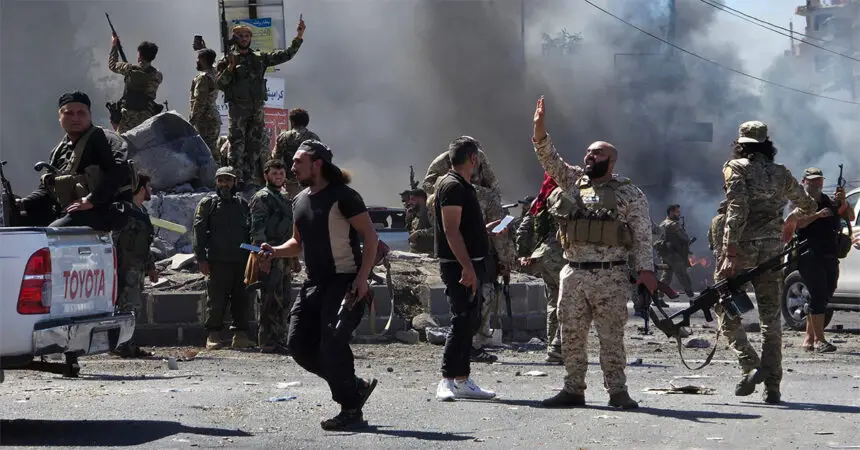Diplomatic de-escalation is the call echoing from the Trump administration, which is stepping in with a firm but measured voice, urging all parties to step back from the brink. This intervention comes as violence between Syria’s Druze minority and Bedouin clans spirals out of control in the south, tragically prompting Israeli airstrikes across the border. US officials aren’t hiding their deep worry – their message is clear: De-escalate. Now.
Druze–Bedouin clashes : What Sparked This Painful Conflict?
Things reached a breaking point in Syria’s Sweida province. Tensions between the Druze community and local Sunni Bedouin clans, simmering for a while, exploded into open fighting earlier this month. It’s been devastating: reports say dozens have lost their lives, hundreds are hurt, and homes and buildings lie damaged. The Syrian government felt forced to send in troops as the clashes worsened, with eyewitnesses describing terrifying gunfire echoing into the night and smoke rising from neighborhoods.

Diplomatic de-escalation : Why Did Israel Get Involved?
Seeing the violence creep towards its border and fearing for Druze civilians caught in the crossfire, Israel launched strikes. They targeted Syrian army positions they believed were advancing into Druze-populated areas near the Golan Heights, stating their goal was purely protective. One significant strike hit Damascus on July 16th, reportedly damaging military infrastructure and, tragically, causing civilian casualties too.
More Read: Fauja Singh: Living the Legacy of Fitness
The US Response: Deep Concern & Diplomacy in Motion
- “We’re Very Concerned”: Secretary of State Marco Rubio didn’t mince words, calling the situation deeply worrying. He confirmed US diplomats are working urgently, talking to everyone involved, pleading for restraint: “We’re talking to both sides… hopefully can bring it to a conclusion.”
- Envoys on the Ground: The US special envoy for Syria, Tom Barrack, is actively reaching out – talking to Israeli, Syrian, and Druze leaders – trying to build bridges and find a way back to calm amidst rising anger.
- Pressing for Pauses: Behind the scenes, the US is even urging Israel to temporarily halt its airstrikes to give diplomacy a chance, with reports suggesting a pause was tentatively agreed pending developments.
Read More :Odisha Student A Cry Unheard : Demands Justice & Reform
Inside Syria: A Fragile Government & Deep Mistrust
The new Syrian government (in place since late 2024) is already under immense strain. The Druze community, historically wary of central authority, grew deeply uneasy when government forces moved into Sweida. Fearing a crackdown more than a peacekeeping mission, some Druze militias resisted, making the already violent Druze-Bedouin clashes even worse.
Read More : OnePlus Nord 5 Review: Power Meets Performance
Ceasefires: Fragile Hopes, Broken Promises
Efforts to stop the fighting have been heartbreakingly stop-start:
- Initial truces between the government and Druze leaders quickly collapsed when influential figures like Sheikh Hikmat al-Hijri rejected them, urging resistance instead.
- A new ceasefire emerged around July 16th, leading to Syrian troop withdrawals. While cautiously welcomed by Druze leaders, everyone knows this peace is incredibly fragile.
Global Reactions & Justifications
- Israel: Stands by its actions as necessary to protect civilians facing military threats near its border.
- Syria & Others: Condemned the strikes as “aggression.” Regional players like Turkey and the EU joined calls for protecting civilians and showing restraint.
Diplomatic de-escalation : Why is the US So Worried?
It’s more than just this immediate violence. The Trump administration fears this crisis could:
- Shatter Syria’s already fragile transition government.
- Lead to even more catastrophic civilian suffering.
- Pull in other powerful regional players – like Iran, Hezbollah, or even NATO allies – turning a local tragedy into a much wider, more dangerous conflict.
The Human Cost: Beyond the Headlines
The real tragedy is measured in shattered lives:
- Estimates suggest over 200 people killed and hundreds more wounded across all sides.
- Druze families in Israel, with loved ones trapped in Syria, protested desperately at the border, pleading for safety and relief for their suffering relatives.
Diplomatic de-escalation : A Diplomatic Tightrope Walk
The US faces a complex challenge:
- Supporting Israel, Navigating Sensitivities: While firmly allied with Israel, the US must also carefully consider Russia and Turkey’s roles and the need to stabilize Syria’s transition.
- Preventing Disaster: A full-blown regional war involving Syria, Israel, Iran, Turkey, or Russia is the nightmare scenario US diplomacy is desperately trying to avoid.
- Proven Pressure: Rubio stressed the need for swift, decisive diplomatic action to cool tempers.
What Comes Next? Fragile Steps Forward
- Watching Carefully: Can the latest ceasefire hold? Monitors will be crucial.
- Talking it Out: Constant diplomatic chatter between Washington, Jerusalem, Damascus, and regional capitals is essential.
- Rebuilding Lives (If Peace Holds): Aid and reconstruction for shattered communities in Sweida can only begin if the guns truly fall silent.
Diplomatic de-escalation : The Bigger Picture: Lessons in Vulnerability
- Druze at Risk: This conflict starkly reminds us how vulnerable minority communities like the Druze remain in regions riven by ethnic and sectarian divides.
- Proxy Playground: Syria continues to be a tragic stage where global and regional powers play out their rivalries through local conflicts.
- Diplomacy’s Value: While fragile, the current lull shows dialogue can work – but it needs constant nurturing and commitment from all sides.
Conclusion: A Narrow Path Towards Calm
The Trump administration is pushing hard: urgent diplomacy backed by a call for measured military responses. The immediate goals are stopping the Druze-Bedouin bloodshed and preventing a catastrophic regional escalation. The new ceasefire and active US engagement offer a glimmer of hope, but real stability depends entirely on everyone involved choosing peace, day after day. It’s a tense, fragile moment for the people of Sweida and the region.










